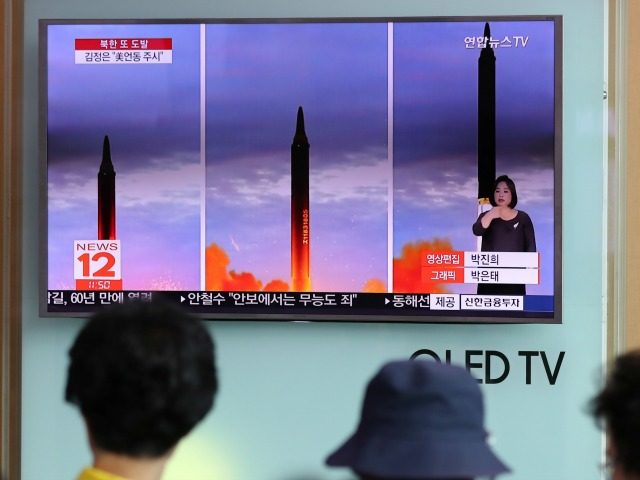North Korea has done nothing to decrease its nuclear stockpile or limit production of fissile material since dictator Kim Jong-un held his first summit with President Donald Trump, a report from the Heritage Foundation released Wednesday asserted.
The report from the Washington-based think tank pointed to the fact that the 2020 Index of U.S. Military Strength report released Wednesday determined that Pyongyang still “poses definite threats to the U.S. homeland,” as well as American military bases in South Korea, Japan, and Guam.
President Trump has held two official summits with Kim Jong-un, the first taking place in Singapore last June, followed by a second one in February in Vietnam this year. Although the two sides signed a joint declaration aimed at working towards peace between the two countries, the U.S. has so far refused to lift any economic sanctions while Pyongyang has shown no indication of dismantling its nuclear arsenal.
The deals did not require America to lift sanctions, but they did require North Korea to work towards “denuclearization of the Korean peninsula.” The deals did not define the term; North Korea often uses it to mean the removal of American military assets from Korea.
“Despite two U.S.–North Korea summit meetings, there has been no decrease in North Korea’s weapons of mass destruction (WMD) arsenal or production capabilities,” the report declares.
It continues:
The U.S. Intelligence Community subsequently assessed that Pyongyang had increased its production of fissile material for nuclear weapons, and satellite imagery showed upgrades to the missile, reentry vehicle, missile launcher, and nuclear weapon production facilities.
Pyongyang likely has already achieved warhead miniaturization, the ability to place nuclear weapons on its medium-range missiles, and an ability to reach the continental United States with a missile.
The Intelligence Community continues to assess that North Korea “is unlikely to give up all of its WMD stockpiles, delivery systems, and production capabilities.”
The report also noted that various military de-escalation measures agreed upon between the South and the North have “not reduced the North’s tactical or strategic conventional military threat to South Korea, nor do they represent progress in denuclearization.”
North Korea’s chief negotiator Kim Miyong Gil announced this month that peace negotiations with the U.S. had “not fulfilled our expectations and broken down” after months of stalemate. According to Kim, negotiations collapsed “entirely because the U.S. has not discarded its old stance and attitude.”
State Department spokesman Morgan Ortagus rejected the comments, arguing they did “not reflect the content or the spirit” of the good discussions” that took place over just one day.
Ortagus said in a statement that the U.S. delegation “previewed a number of new initiatives that would allow us to make progress in each of the four pillars” of a joint declaration signed by Trump and Kim following their first summit.
“The United States and the DPRK will not overcome a legacy of 70 years of war and hostility on the Korean Peninsula through the course of a single Saturday,” Ortagus said
Follow Ben Kew on Facebook, Twitter at @ben_kew, or email him at bkew@breitbart.com.

COMMENTS
Please let us know if you're having issues with commenting.